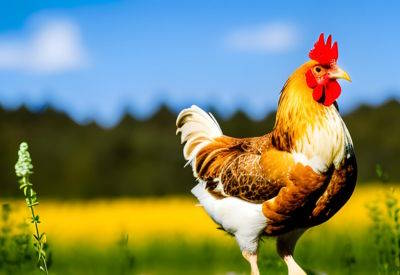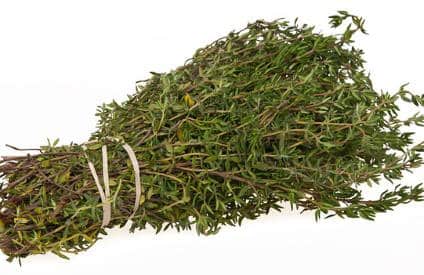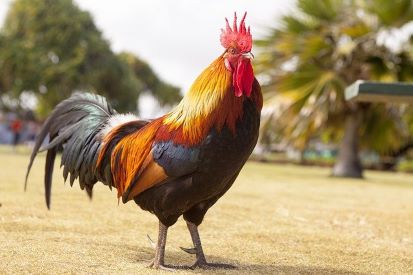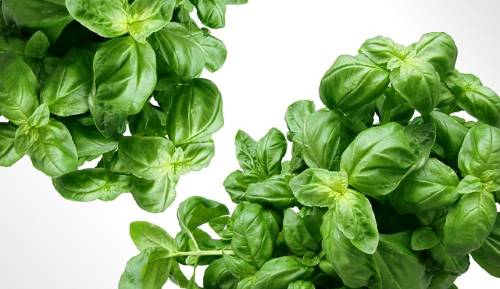Hey there, fellow chicken enthusiast! When it comes to raising our feathery friends, we’re always on the lookout for ways to keep them healthy and happy. I recently found myself wondering, can chickens eat thyme? Turns out, thyme isn’t just a delicious addition to our meals, but it can also offer some fantastic benefits for our clucking companions.
I don’t know about you, but as a fellow chicken owner, I’m always eager to find natural ways to support my flock’s health. And guess what? Thyme could be a game-changer! Not only is it safe for chickens to eat, but it also has numerous advantages that can boost their immune system, respiratory health, and even improve the taste of their eggs. I mean, who doesn’t want tastier eggs, right?
So, buckle up and let’s dive into the world of thyme for our beloved chickens. In this article, we’ll explore the benefits of feeding thyme to your chickens, things to watch out for, and how to best prepare and serve this delightful herb. You’ll even discover if those adorable baby chicks can partake in the thyme goodness. Trust me, you won’t want to miss this thyme-ly (pun intended) information!

Can chickens eat thyme?
I’m glad you asked. So, can chickens eat thyme? The short answer is yes, they absolutely can! Thyme is a safe and healthy herb that can be a great addition to your chicken’s diet.
But before you go throwing handfuls of thyme into their coop, let’s talk about why it’s beneficial and how to best prepare and serve it to your feathered friends.
[ChickenAffiliate]
The benefits of eating thyme for chickens
You might be wondering what’s so great about thyme for chickens, right? Well, thyme is a fantastic herb that has several benefits for your chickens.
Boosting their immune system
Thyme is packed with antioxidants and essential oils, which can help keep your chicken’s immune system in tip-top shape.
Supporting respiratory health
Thyme is known for its ability to help with respiratory issues. It has antimicrobial and anti-inflammatory properties, which can aid in keeping your chickens’ respiratory systems healthy.
Natural pest control
You know those pesky mites and lice that can bother your chickens? Thyme can help with that! The strong scent of thyme is believed to repel these little nuisances, making it a natural pest control solution.
Enhancing the taste of eggs
Believe it or not, thyme can make your chickens’ eggs taste even better! Chickens that eat thyme tend to produce eggs with a more flavorful and aromatic taste.
Things to watch out for when feeding thyme to chickens

As with anything, moderation is key. While thyme is safe and beneficial for your chickens, there are a few things to keep in mind.
Don’t overfeed
Too much of a good thing can be bad. Overfeeding thyme can lead to an imbalance in your chickens’ diet, so make sure it’s just a part of their overall balanced meal plan.
Quality matters
It’s important to use high-quality, pesticide-free thyme. This ensures that you’re not introducing harmful chemicals into your chickens’ diet.
Be mindful of other herbs and plants
While thyme is safe for chickens, not all herbs and plants are. Be cautious when introducing new plants into their diet and do your research to ensure they’re safe for consumption.
How often should chickens eat thyme?
Now that we know thyme is a great addition to your chickens’ diet, you might be wondering how often to feed it to them. Thyme should be considered a treat and not a staple in their diet.
Feeding thyme to your chickens once or twice a week should be more than enough to reap its benefits. Remember, balance is key when it comes to your chickens’ health and well-being!
How to prepare thyme for feeding to chickens

Ready to start feeding thyme to your chickens? Here’s how to prepare it.
Harvest or purchase fresh thyme
Ideally, you should use fresh thyme rather than dried thyme. This is because fresh thyme has more potent essential oils and beneficial properties.
Wash the thyme
Give the thyme a good rinse to remove any dirt or debris. This is especially important if you’re using thyme from your own garden or purchasing it from a farmer’s market.
Chop or tear the thyme
Chickens can have a bit of trouble with larger pieces of thyme, so it’s best to chop or tear it into smaller, more manageable pieces.
Serve it up
Mix the thyme in with your chickens’ regular feed or scatter it around their coop for them to enjoy. You can also hang a bundle of thyme in their coop or run, allowing them to peck at it throughout the day.
Combine with other herbs
Feel free to get creative and mix thyme with other safe and beneficial herbs for your chickens, like oregano, lavender, or mint. This can provide additional health benefits and make their treat even more enjoyable.
Can baby chicks eat thyme?

Now, let’s talk about those adorable baby chicks. Can they enjoy thyme as well? Yes, baby chicks can eat thyme, but it’s essential to introduce it gradually and in smaller quantities. Since their digestive systems are still developing, you’ll want to be cautious about adding new foods to their diet.
Here’s how you can introduce thyme to baby chicks.
Wait until they’re at least two weeks old
It’s best to wait until your baby chicks are at least two weeks old before introducing any new foods or treats, including thyme.
Start with small amounts
Begin by offering small amounts of finely chopped thyme mixed into their chick starter feed. Keep an eye on them to ensure they’re not experiencing any adverse reactions.
Gradually increase the quantity
Over time, you can gradually increase the amount of thyme you’re feeding your baby chicks. Remember, moderation is key, and thyme should be considered a treat, not a staple in their diet.
What other herbs can chickens eat apart from thyme?

In addition to thyme, several other herbs can provide fantastic health benefits for your chickens. Let’s explore five of these delightful herbs that your flock will love to munch on.
Cilantro
Cilantro, also known as coriander, is another herb that your chickens can enjoy. Packed with vitamins, minerals, and antioxidants, cilantro can help boost your chickens’ immune system and promote overall good health. It’s also believed to help improve digestion and reduce inflammation, making it a great addition to their diet.
Read More: Can Chickens Eat Cilantro? 6 Important Benefits
Basil
Basil is a versatile herb that chickens can eat, and it offers some pretty impressive benefits. It’s known for its antibacterial and anti-inflammatory properties, which can help keep your flock in tip-top shape. Basil can also help repel insects and parasites, providing a natural pest control solution. Plus, it has a pleasant aroma that your chickens will surely appreciate.
Read More: Can Chickens Eat Basil? 5 Fantastic Benefits
Parsley
Parsley isn’t just a garnish for your dinner plate – it’s also a nutritious treat for your chickens! High in vitamins A, C, and K, parsley can help improve your chickens’ overall health and well-being. It also contains essential minerals like iron and calcium, which are important for maintaining strong bones and eggshell quality.
Read More: Can Chickens Eat Parsley? 4 Fantastic Benefits
Rosemary
Rosemary is another fantastic herb that your chickens can safely enjoy. Known for its antioxidant properties, rosemary can help protect your chickens from various health issues and support their immune system. It’s also believed to have a calming effect on chickens, reducing stress and promoting relaxation. And as a bonus, its strong scent can help repel pests and keep your coop smelling fresh.
Read More: Can Chickens Eat Rosemary? 5 Amazing Benefits
Mint
Mint is a refreshing herb that your chickens will love to snack on. Its cooling effect can be particularly helpful during hot summer months, helping to keep your flock comfortable and less stressed. Mint is also known for its digestive benefits and can help soothe your chickens’ gastrointestinal systems. Plus, its strong scent can help deter pests and rodents from invading your coop.
Read More: Can Chickens Eat Mint? 5 Amazing Benefits
Many herbs besides thyme can offer fantastic health benefits for your chickens. By incorporating cilantro, basil, parsley, rosemary, and mint into their diet, you can support their overall health and well-being, while also providing them with a delicious and nutritious treat.
The importance of variety
With all the valuable information we’ve covered, there’s just one more thing to add: the importance of variety and balance in your chickens’ diet. While herbs like thyme, cilantro, basil, parsley, rosemary, and mint can provide numerous health benefits, it’s crucial to remember that they should be just a part of a well-balanced diet for your chickens.
Ensure that your chickens have access to high-quality feed that meets their nutritional needs, along with fresh water, grit, and calcium supplements like crushed oyster shells or eggshells. This will help them maintain optimal health and produce delicious, nutrient-rich eggs.
Additionally, it’s a good idea to rotate the herbs you provide to your chickens to keep their diet varied and interesting. This way, they can enjoy the full range of benefits that different herbs have to offer while preventing them from getting bored with their meals.
Can chickens eat thyme – final thoughts
And there you have it, my fellow chicken-loving friends! Can chickens eat thyme? You bet they can! Not only is thyme a tasty treat for our feathered pals, but it’s also chock-full of health benefits that can enhance their immune system, respiratory health, and even give those already scrumptious eggs a flavor boost. Just remember to keep thyme as a treat rather than a staple, and your flock will surely thank you for it.
So, next time you’re whipping up a delicious meal and reach for that sprig of thyme, don’t forget to share the love with your clucking companions. After all, a little thyme can go a long way in keeping our chickens healthy and content. Go ahead, spice up their lives (and their coop) with some delightful thyme, and watch as your flock thrives.
Related Articles:
